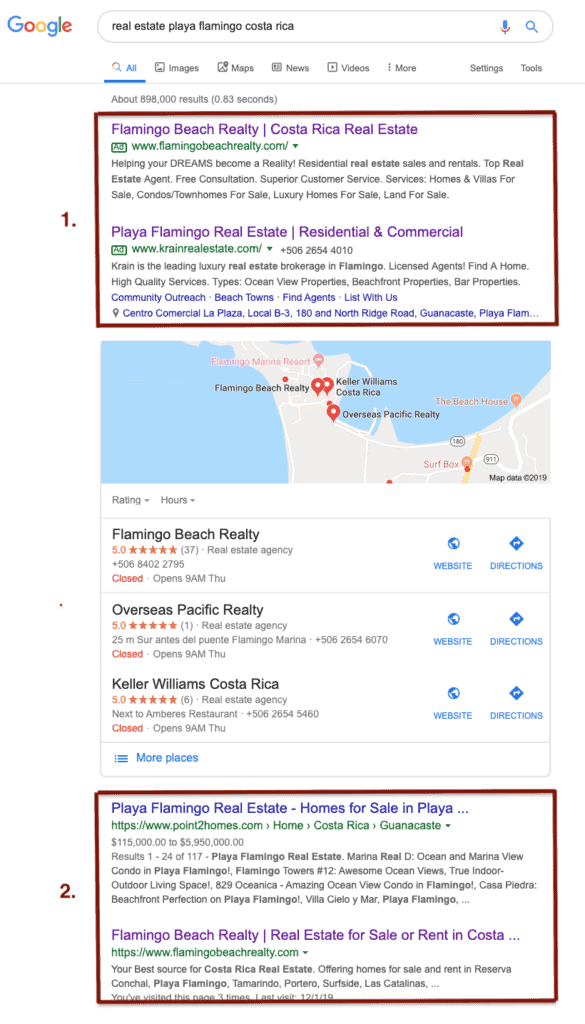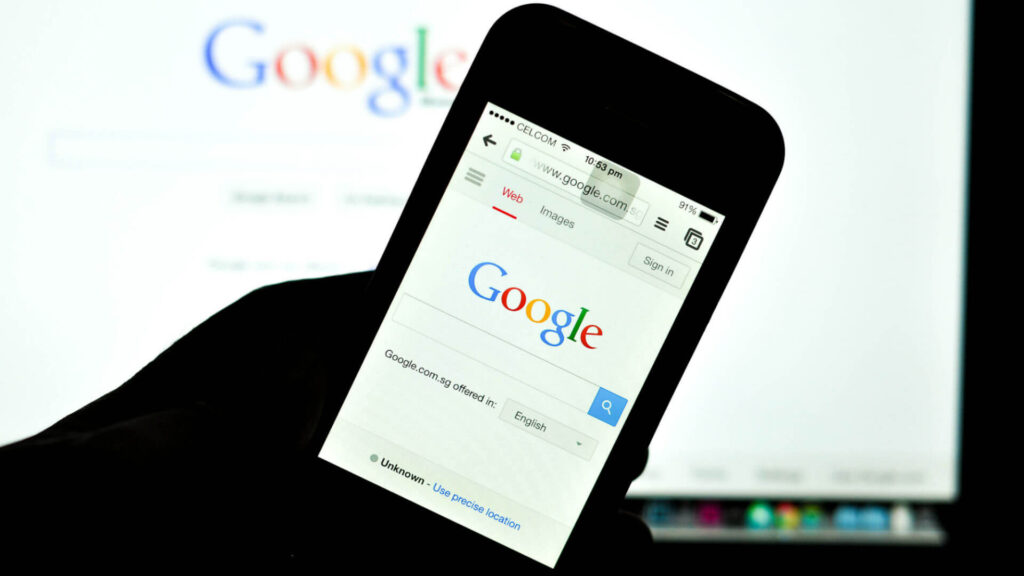When talking about marketing, you often hear the terms SEO and SEA. But what do these terms mean, and how can you use these digital marketing techniques for your company? In this article we will delve deeper into both digital marketing strategies to help you make an educated decision for your business.
SEO and SEA: The meaning
SEO is short for Search Engine Optimization. SEO includes all activities that you carry out to ensure that your website scores higher in the organic results of search engines such as Google. Search Engine Advertising (SEA), also known as PPC or Pay-Per-Click. Is the process of advertising directly on Google and other similar search engines. When using SEA, search engines will show ads for your company in the search results above the organic results. In the image below you can see how google displays the search engine advertisments (1) and the organic results (2) when using the query “real estate playa flamingo costa rica”.

SEO versus SEA
Both online marketing forms aim to attract more traffic to your website. For SEA you need to pay advertising costs, usually in the form of pay per click. SEA provides immediate results, however the results only exist as long as you are paying for the advertisements. In the case of SEO website traffic is generated organically. This means that traffic from search engine searches is free and does not requite a fee per click such as with search engine advertising. However, developing organic visibility takes time and effort (money). Most likely you will need to outsource the SEO work to a specialist that can help you rank higher and improve your organic online presence. In many cases, SEO and SEA work best when integrated together and strategically aligned to cover both short-term and long-term goals.
Difference between SEO & SEA
There are a number of important differences between SEO and SEA. They are as follows:
- Getting a high ranking in the organic search results pages of Google (SEO) can take several months, while search engine advertisements (SEA) are immediately visible on top of the search results. Therefore, search engine advertisements offer instant results in terms of website traffic. With SEO this can take a while.
- Google offers less insight with organic search results. For example, you are not able to see with which keyword your website visitor ended up on your site. With search engine advertising Google does provide you this information. With conversion tracking and the Google Ads system you can determine what keywords convert and at what cost.
- Paid search results in Google are largely at the top of the page. Usually four advertisements are shown on desktops and three on mobile phones. A user will always see the paid searches, even if they scroll past them. The unpaid search results are sometimes not even visible without scrolling down.
- Unlike search engine advertisements, organic visibility and traffic doesn’t dry up when you stop paying. Efforts to develop organic traffic and visibility are more sustainable than advertisements in the long run. SEA needs a constant investment.
- With paid advertisement you can very easily control your budget. Determine how much you are willing to spend per day and set a fixed budget. This is important to ensure you don’t exceed your limit, as it can go very fast with paid advertisements! For this reason we suggest outsourcing your search engine advertising, as an experienced professional can optimize your campaigns with a lower budget, thereby saving you money! Outsourcing your Google Ads is often not only more effective, but also cheaper. Read more about this in our other blog “5 reasons to outsource your digital marketing“.
- Search engine advertising can be expensive. It is not always the case, but costs can quickly add up if you don’t constantly monitor and optimize your campaigns. We always advise clients to outsource their ads to an expert to keep their Google Ads account in top shape. Traffic from organic searches is free. It does take effort to develop online visibility but it is more cost-effective than advertising.
- With paid advertisements you can target specific keywords, which is also the case with SEO. However, advertisements also allow you to target specific locations, languages, devices, and audiences based on previous website visits.
- With paid search advertisements you have more control and space to deliver your marketing message. The advertisements enable you to highlight extra information such as: your phone number, opening hours, business location, Unique Selling Points (USP’s) and more. Just like you can see in the example down below.
The combination of SEO and SEA
Ideally we advise our clients to invest in both SEO and SEA as there are advantages and disadvantage to both. An optimal online marketing strategy will take advantage of both methods as they complement and support each other very well.
- SEA gives you direct feedback on the keywords you advertise on, so you learn what the intention is of people searching for a specific term. This intelligence can be used for organic search engine marketing (SEO) to improve results.
- You can test your keyword strategy in Google Ads, if it works you can use it for a long-term SEO strategy.
- You can use the A/B testing data from SEA into your SEO strategy. For instance, you will discover what ad copy works best based on the clicks in SEA. You can use this in your meta data descriptions.
- You increase confidence and awareness among potential customers when you’re visible both organically and through paid advertisements. This will result in your website coming up twice during searches.
In other words, a unified search engine marketing strategy with both SEO & SEA is the optimum approach, leading to improved results in the short and long term. Of course, every market is different and a tailor made online marketing strategy fit to your specific business needs will provide the most benefits. Curious what online marketing can do for your business? Get in touch with us for a free online marketing consultation today. Do you have a question about this article? Or do you want to know what we can do for you?





